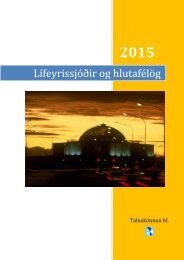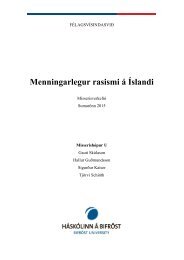You also want an ePaper? Increase the reach of your titles
YUMPU automatically turns print PDFs into web optimized ePapers that Google loves.
WORLD REPORT 2016<br />
HUMAN RIGHTS WATCH<br />
Nigeria<br />
Relatively peaceful presidential and gubernatorial elections in March and April<br />
2015 marked a positive shift in Nigeria’s history of political violence. However,<br />
the inauguration of President Muhammadu Buhari has not diminished the potency<br />
of the country’s serious human rights challenges. Violence and insecurity<br />
persist in the northeast despite the recapture, from the militant group Boko<br />
Haram, of dozens of towns and the rescue of over 1,000 hostages by Nigerian<br />
and neighboring countries’ forces. The name Boko Haram means “Western education<br />
is forbidden.”<br />
Boko Haram carried out probably its most vicious attacks in January around<br />
Baga, a fishing settlement in Borno state, northeast Nigeria, killing at least<br />
2,000 people and sacking the military base of the Multinational Joint Task Force<br />
(MNJTF). More than 9,500 civilians have died in the conflict and the number of<br />
displaced people has increased from just over 1 million at the end of 2014 to almost<br />
2 million in 2015. Nigerian security forces have neither taken adequate<br />
steps to protect civilians during operations against Boko Haram, nor to protect<br />
the rights of rescued hostages.<br />
In other parts of the country, frequent violence between farmers and cattle owners<br />
in the north-central states remained unresolved in 2015. There have been few<br />
investigations or prosecutions against those responsible for the violence. The<br />
lack of justice for victims helped fuel reprisal attacks, leading to continuous cycles<br />
of violence. Impunity for human rights crimes—such as torture committed by<br />
security forces, including police—remained pervasive.<br />
Abuses by Boko Haram<br />
The conflict in the northeast between the militant group Boko Haram and Nigeria’s<br />
security forces grew more deadly in 2015. By the beginning of the year, Boko<br />
Haram had seized control of 17 local government areas (LGAs) across parts of the<br />
northeast in Adamawa, Bauchi, Borno, and Yobe states. LGAs are the third and<br />
lowest level, after federal and state levels, in Nigeria’s administrative structure.<br />
Security forces from Nigeria and its neighbors have since regained control of<br />
most of the towns, but the rebels remained active in many rural areas. In July, the<br />
governors of Borno and Yobe states said that Boko Haram retained control of a<br />
total of five LGAs in their states. An estimated 3,500 died in the conflict in 2015,<br />
while most of the 2 million displaced people live with limited access to basic<br />
rights like food, shelter, and healthcare.<br />
The horrific attack in Baga and on the nearby MNJTF headquarters was followed<br />
by repeated attempts by Boko Haram in January and February to seize military installations<br />
in Maiduguri and Monguno, both in Borno state. Increasing cross-border<br />
attacks led to an African Union sanctioned renewal of the MNJTF agreement<br />
and the mobilization of forces from Nigeria, Cameroon, Chad, and Niger. Boko<br />
Haram violence intensified in more than 200 attacks against communities in<br />
these countries since February, apparently in retaliation for the involvement of<br />
their security forces in military operations.<br />
The group also continued to attack schools, abduct hundreds of women, and increase<br />
its use of children as suicide bombers. On July 26, in a style typical of<br />
Boko Haram bombings, a 10-year-old girl blew herself up in a busy market in<br />
Damaturu, Yobe state, killing at least 15 and injuring 46. Government forces managed<br />
to rescue over 1,300 hostages, but none of the 219 missing school girls abducted<br />
by the insurgents in April 2014. Some of the rescued people have been<br />
held in military facilities since May with little clarity about their status as victims<br />
or detainees.<br />
Conduct of Security Forces<br />
Nigerian authorities have yet to open credible investigations into allegations of<br />
heavy-handed and abusive response to the insurgency by security forces. Since<br />
2009, hundreds of men and boys in the northeast have been rounded up and detained<br />
in inhumane conditions for suspected membership or provision of support<br />
for Boko Haram.<br />
There are also allegations of use of excessive force, and inadequate civilian protection<br />
measures, including for Boko Haram hostages, by the military in the ongoing<br />
operations in the northeast. When the Nigerian army drove at high speed<br />
into Sambisa Forest Reserve in late April, some Boko Haram hostages, mostly<br />
women and children, were crushed by moving trucks. Survivors said soldiers did<br />
not issue instructions on how the hostages could avoid danger.<br />
422<br />
423










